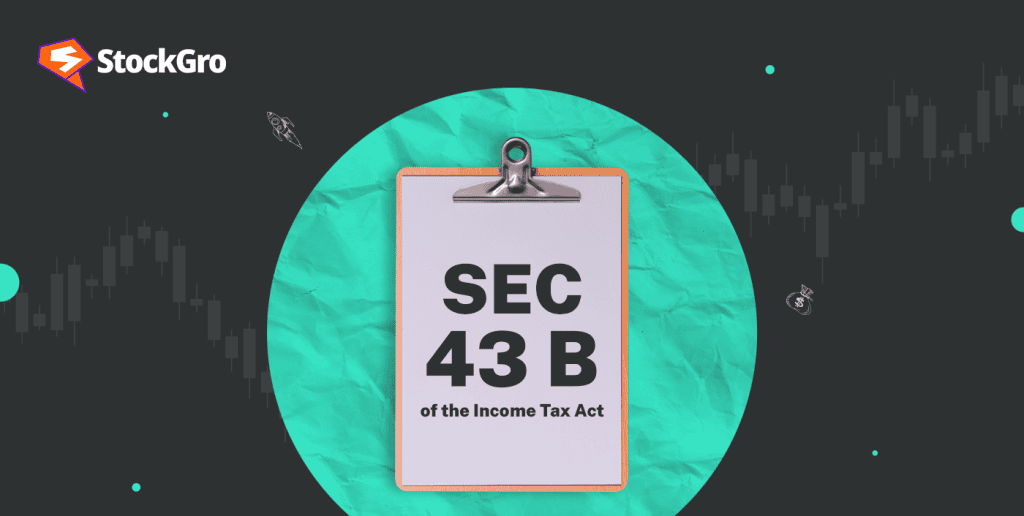
Section 43B of the Income Tax Act 1961 allows certain payments to be claimed as expenses only when you make the actual payment, regardless of when the expense was incurred.
In this article, we will look in detail at the provisions of this act and some exceptions and conditions.
Section 43B of the Income Tax Act: Overview
Section 43B of the Income Tax Act dictates that certain payments a business makes can be used for tax deduction purposes only when they pay cash. Taxpayers cannot deduct these payments if they are incurred or due and cash is not paid.
This section encourages businesses to make certain payments on time. Businesses must make actual payments to claim tax deductions for the current assessment year. Also, this section ensures that businesses do not claim deductions for some accrued expenses even if real cash is not paid for them.
Also read: Maximise your nest egg with section 80TTB tax tricks
Section 43B of the Income Tax Act: Provisions
The aforementioned expense can only be used for tax deduction when cash is paid. The expenses that fall under the provision of Section 43B of the Income Tax Act are as follows:
- Tax or Statutory dues: Any tax payments made during the financial year are deductible under section 43B. These taxes include goods and services tax (GST), cess, customs duties, and interest paid on tax is also deductible.
- Employee welfare fund contributions: Payments made towards employee welfare programs like provident fund, gratuity fund, etc, are deductible under this section only when actual cash has been paid.
- Bonus or commission: Any payment made towards paying a bonus or a commission to the employees is deductible when actual cash is paid. Bonus or commissions given in the form of dividends on stocks held by employees are not deductible.
- Leave encashment: Companies provide paid leaves to employees, and if employees do not use these leaves, they are compensated with additional money equivalent to the unused leave days. This expense is deductible only when an actual cash payment is made.
- Payments made to Indian railways: Payments to Indian Railways, such as ticket bookings, are deductible only when made in cash.
- Interest on Loan: Interest paid on loans availed from financial institutions or banks can be used for tax deduction purposes only when actual cash is paid and not when these are due.
Latest amendments made in section 43B
Section 43B Clause (h) was introduced in the finance bill 2023 to be implemented from 1st April 2024.
The MSMED Act 2006 states that all payments made to a small or micro-enterprise should be made within 15 days (or 45 days in case of an agreement). Interest can be charged if any payments are made beyond this time period.
Clause(h) states that payments made to micro and small enterprises are tax deductible in the current financial year only if made on time as specified by the MSMED Act. Payment will be tax deductible only in the financial year it is paid. Under this clause, medium enterprises are not involved.
This clause ensures that all payments made to small businesses are on time.
For example, if a large company buys raw materials from a small enterprise on 1st February 2025 and makes the payment on 15th February, then this payment can be used for a tax deduction in FY2024-25. Suppose the payment is made on 5th April 2025. It can be used for tax deduction purposes in FY2025-26.
Also read: Inheritance tax in India: Is it applicable today?
Conditions to claim deduction under section 43B
For availing of the tax benefits under Section 43B, certain conditions have to be met.
First, the payment must not just be incurred but actually paid by the business. Payments due but not yet paid will be ineligible for tax deduction.
Second, the payments must be made on or before the due date for filing the income tax return (ITR). Any payment made after that will be deductible in the next financial year.
Third, the evidence of payment needs to be presented while making the payments. These proofs can be in the form of bills, receipts, written documents, or any other paperwork.
Also read: How much tax do you pay on stock market gains?
Exceptions to section 43B
Companies can choose to settle their interest on loans in the form of issuing shares to their creditor or converting the interest amount into a loan. If the payment of interest due is made by issuing share capital or if it is converted into a loan, then these are not deductible under section 43B.
Advance cash payments for expenses not yet incurred are deductible under Section 43B of the Income Tax Act. For example, advance payment of duties or taxes are deductible.
Conclusion
Income Tax Act, Section 43B encourages businesses to make certain payments in time. Also, this section makes sure that businesses are really making payments for the expenses they are claiming deductions for, and these are not just incurred on paper. Also, this section ensures that Micro and small enterprises (MSE) businesses receive the payments on time so that their functioning does not get affected. ts on time so that their functioning does not get affected.
FAQs
According to section 43B, certain expenses made by a business can only be claimed for tax deduction when an actual cash payment is done and not when they become due. This act covers statutory payments, employee welfare expenses, bonuses or commissions, payments made to Indian railways, leave encashment, interest on loans, and MSE payments.
Yes, Interest payments that are made in cash towards loans taken from financial institutions can be claimed as tax expenses. But if interest payments are not made in cash and instead are made in the form of issuing share capital or converting the interest due into loans, then these are not deductible.
Section 43(B) was introduced so businesses would pay their necessary dues on time. To claim tax expense deductions, businesses must make cash payments. This section also ensures that businesses are not claiming tax deductions on expenses made on paper and not paid.
Clause(h), effective from 1st April 2024, is the latest amendment made in section 43(B). Clause(h) states that payments made to micro and small enterprises are tax deductible in the current financial year only if made on time as specified by the MSMED Act. Otherwise, payment will be tax deductible only in the financial year it is paid.
Accrued payments are payments that are due but have not yet been paid. For example, if a business purchases some goods but the payment for the same has not been made, then this is an accrued payment because this is an expense that the business will incur in the near future. Cash expenses are paid in cash.

